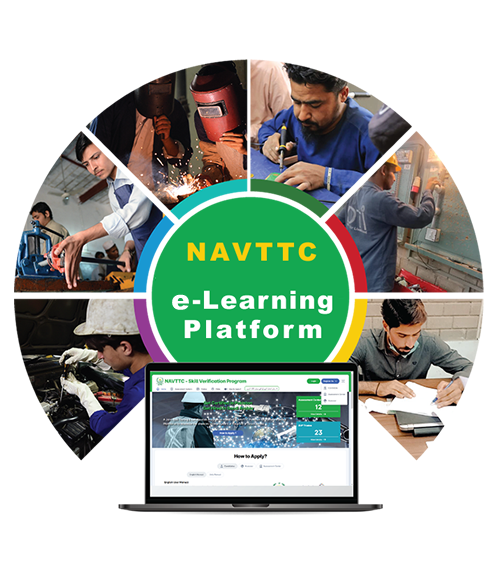We are pleased to announce that a new academy with full featured facilities, is avialable now for all the students in Islamabad F-10.
Select a Course
Choose a course relevant to your career goals




Empowering youth through education and skills development
We Honor the 120,000+ Skilled Youth in Industrial Trades
We Honor the 16,000+ Skilled Youth in IT Trades
We Honor the 415,000+ Skilled Youth in Conventional
Find a wide range of in-demand courses with complete description
Make learning and teaching more effective with active participation and student collaboration

Choose a course relevant to your career goals
Complete online registration process
Log in and click on the course to enroll
Start your journey towards skill excellence

NAVTTC received 575,000 applications for free certificate courses in High-Tech IT, Industrial, and Conventional skills under the Prime Minister’s Youth Programme. The diverse pool of youth applicants stands as a testament to NAVTTC’s commitment to paving the way for an inclusive and empowered workforce. Join NAVTTC in shaping a future where skills know no boundaries!
Learn MoreJoin the NAVTTC community for vocational trainings as an assessor, trainer, trainee, or institute.
Read MoreAccredit with NAVTTC, Elevate Your Impact for vocational training and emplyment
Read MoreSkill Verification Program: Get Certified in Pakistan, Get Employed in Saudi Arabia
Read MoreWe are pleased to announce that a new academy with full featured facilities, is avialable now for all the students in Islamabad F-10.
Certificates will be distributed among the Student who have completed their courses from NAVTC on 20th of September 2024.
New Courses are available for the registered student. Please register on the site to get the latest facilities of it.

Join us at the UNESCO-UNEVOC Centre Magdeburg for an insightful Expert Meeting on AI and TVET.
Join us at the UNESCO-UNEVOC Centre Magdeburg for an insightful Expert Meeting on AI and TVET.
Discover the latest developments in AI teacher training programs, AI applications, and the integration of AI into higher education. Gain valuable insights into the competencies needed for future jobs and practical strategies for incorporating AI into curricula and training programs.
Engage with cutting-edge research and best practices in AI and TVET Network with international experts and stakeholders Develop actionable strategies to integrate AI into education and training programmes Experience state of the art training & research facilities in action/hands on Explore the future competencies needed for an AI driven workforce Learn about industry use cases first hand and on-site.
Educators, policymakers, industry leaders, and researchers

This course is designed to sensitize for and introduce immersive
learning in a practice-oriented way. It introduces the spectrum
of Mixed Reality (XR) with its technologies Virtual and Augmented
Reality (VR/AR), 360-degree video and 3D. The course enables
participants to get to know the different learning technologies
and to get hands on experiences. The training shows
where
and how learning processes can be improved in a meaningful way
with XR.
This course is designed to sensitize for and introduce immersive
learning in a practice-oriented way. It introduces the spectrum
of Mixed Reality (XR) with its technologies Virtual and Augmented
Reality (VR/AR), 360-degree video and 3D. The course enables
participants to get to know the different learning technologies
and to get hands on experiences. The training shows
where
and how learning processes can be improved in a meaningful way
with XR.
On completion of the training, participants

To immerse yourself in other worlds, the introductory module "Immersive Learning Basics" of the course "21stCentury Technologies for Teaching and Learning - VR/AR/XR" is an ideal way. This module is designed to sensitize for and introduce immersive learning in a practice-oriented way. It introduces the spectrum of Mixed Reality (XR) with its technologies Virtual and Augmented Reality (VR/AR), 360-degree video and 3D.
To immerse yourself in other worlds, the introductory module "Immersive Learning Basics" of the course "21st Century Technologies for Teaching and Learning - VR/AR/XR" is an ideal way. This module is designed to sensitise for and introduce immersive learning in a practice-oriented way. It introduces the spectrum of Mixed Reality (XR) with its technologies Virtual and Augmented Reality (VR/AR), 360-degree video and 3D.
On completion of the training, participants
This module takes place in two half-day sessions face-to-face in English. It is the first of four modules.
We also offer complementary training on the following topics:

This course addresses GIZ advisors aiming at strengthening their
capacities to support project partners in the field of management
of TVET institutions and other training providers. 21st Century
Leadership in the
educational sector is based on an appreciative growth-mindset
attitude
which should be embraced by the whole institution and spearheaded
by the
management. The course provides an overview of the theory and
practice of
modern leadership competencies and behaviours in TVET, and the
processes
needed to initiate a corresponding change process in the
institutional environment. The concept of transformational
leadership combined with new approaches to agile and change
management tools and methods will form the focus of the
programme.
This course addresses GIZ advisors aiming at strengthening their
capacities to support project partners in the field of management
of TVET institutions and other training providers. 21st Century
Leadership in the
educational sector is based on an appreciative growth-mindset
attitude
which should be embraced by the whole institution and spearheaded
by the
management. The course provides an overview of the theory and
practice of
modern leadership competencies and behaviours in TVET, and the
processes
needed to initiate a corresponding change process in the
institutional environment. The concept of transformational
leadership combined with new approaches to agile and change
management tools and methods will form the focus of the
programme.
On completion of the training, participants
GIZ employees working for a TVET programme or other sector
projects with
TVET elements
Virtual format e.g., implemented with the following methods:

This introductory course provides an overview of TVET
management from a
quality perspective. The training introduces different areas
which contribute to quality in TVET. The practice-oriented
approach enables participants to analyse the status quo of
processes in their working environment regarding the identified
quality areas. This provides a basis to identify and
prioritise
areas with needs for quality enhancement in their institution.
This introductory course provides an overview of TVET management
from a
quality perspective. The training introduces different areas
which contribute to quality in TVET. The practice-oriented
approach enables participants to analyse the status quo of
processes in their working environment regarding the identified
quality areas. This provides a basis to identify and
prioritise
areas with needs for quality enhancement in their institution.
On completion of the training, participants:
Face-to-face format recommended , other formats on request.
The implementation of the training considers interactive methods
and
encourages participants to transfer the gained knowledge to their
working
context.
Additional options bookable on request:

The course aims to empower management and teaching staff of TVET
institutions to initiate and develop cooperation with the
industry / the
private sector. It guides the participants through the
different areas of
cooperation and how to engage in public private partnerships
from
analysing frame conditions, to making the first contact, later on
planning and
conducting cooperation until evaluating and continuous
improvement of the
involved processes.
The course aims to empower management and teaching staff of TVET
institutions to initiate and develop cooperation with the
industry / the
private sector. It guides the participants through the
different areas of
cooperation and how to engage in public private partnerships
from
analysing frame conditions, to making the first contact, later on
planning and
conducting cooperation until evaluating and continuous
improvement of the
involved processes.
On completion of the training, participants:
This training can be booked for groups of up to 18 people. The price for the online training is 12,000.00 Euro; additional costs apply for face-to-face training.

The aims to empower teaching staff of TVET institutions and
universities to
improve their teaching and learning methodology by introducing
them into
the concept and philosophy of CBET, which is the fundament for
all modern
TVET approaches, methods and standards. It focusses on the
transformation from traditional input oriented teaching and rote
learning to more modern, effective and outcomes oriented
approaches, focusing on the students, their learning outcomes and
the world of work.
The aims to empower teaching staff of TVET institutions and
universities to
improve their teaching and learning methodology by introducing
them into
the concept and philosophy of CBET, which is the fundament for
all modern
TVET approaches, methods and standards. It focusses on the
transformation from traditional input oriented teaching and rote
learning to more modern, effective and outcomes oriented
approaches, focusing on the students, their learning outcomes and
the world of work.
On completion of the training, participants
We also offer complemantary trainings:

A greener economy requires a workforce with adequate green skills. The participants will learn which concepts of green transitions are currently discussed on system and on company level and explore what their respective implications are for green jobs and green skills development.
A greener economy requires a workforce with adequate green skills. The participants will learn which concepts of green transitions are currently discussed on system and on company level and explore what their respective implications are for green jobs and green skills development.
On completion of the training, participants:

Following a systematic overview of the key labour market
challenges in developing countries, the focus of the course will
be on the basic concepts of
employment promotion and specific approaches surrounding labour
market
policy
Following a systematic overview of the key labour market
challenges in developing countries, the focus of the course will
be on the basic concepts of
employment promotion and specific approaches surrounding labour
market
policy
In this training course, you will learn about
You are a member of the GIZ staff team or an external customer, i.e. a member of national or international staff in an implementing agency and your work in the field of labour market policy and employment promotions.
We also offer complementary training on the following topics





